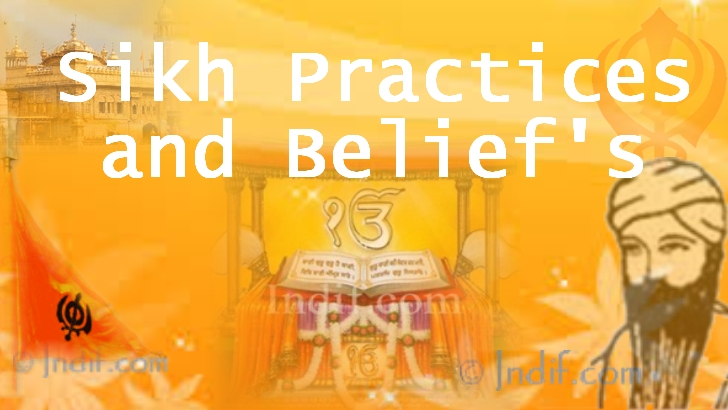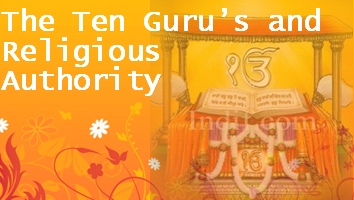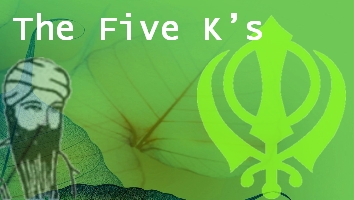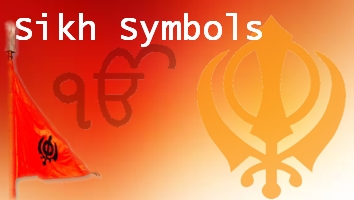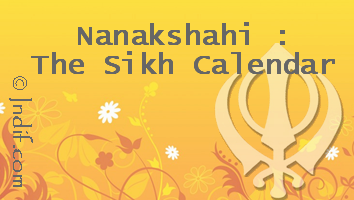ੴ
Sikh practices are based on simple and practical guidelines laid out by the Gurus for the practice of the "Sikh way of life".
The Sikh way of life is based broadly on the life and teachings of Guru Nanak. He says, "truth is high, but higher still is truthful living... This world is the abode of God and the True One lives therein."
The Fundamental principles of Sikhism is,"There is only one being and Truth is its Name." Sikhs believe in the Divine One, the Supreme Ultimate Reality through which the universe was created and continues to exist. The Sikh Ultimate Reality is without physical form. It cannot be seen or represented visually in a picture or statue. It is conceived as being without form or shape (niankar). Therefore no image or idol can represent God.
The Sikh way of life is based on three essential teachings of Guru Nanak -
- Naam Simran : means to meditate on God's name. The essence of Sikhism is the remembrance of "Naam" (God / Divine). There are number of terms used for Sikh worship, including path karna, naam japna, and naam simran. Simran helps you to get closer to God and brings peace of mind.
-
Kirat Karni
:
means
to earn
one's
livelihood
through
honest
means. Sikhs
should only
accept what
they have
earned by
honesty and
hard work
Sikhs shouldn't take away what rightfully belongs to others. Kirat literally means work and Karni denotes "to do." The principle of Kirat Karni has greatly contributed to forgoing social awareness among the Sikhs. Guru Nanak said that those who depend on the earnings of others and exploit them for their own selfish gratification lead a worthless life. - Wand chhakna : means charity donations. The term wand means "sharing," while chhakna denotes "eating." Sikhs should give to the poor and needy in the form of charity. Guru Nanak peached the principles of Kirat karni and wand chhakna for the social, moral, and spiritual development of his followers. Guru Nanak said, " Only he who earns his living by the sweat of his brow and shares his earnings with others has discovered the path of righteousness."
- Sewa :
Sewa literally means voluntary
selfless service for the community.
It is the
duty of
every Sikh
to engage in
Sewa
whenever
there is a
possibility.
Sewa is
important to
Sikhs
because it
helps build
a better
community
and also
keeps the
Sikhs humble
by
suppressing
ego.
Sikhs express their beliefs and feel
priviledged through service at the Gurudwara.
They cook, serve food, clean dishes and
kitchen, and upkeeping the gurudwara
as part
of their service. Sikh children learn the
fundamental principle of sewa at the Gurudwara. Many
parents encourage their kids to perform sewa at the
gurudwara. The kar Sewa (Voluntary service for
cleaning silt from the reservoir of the Golden
temple) is regarded as one of the most auspicious
acts of sewa.
Bhai Gurdas, scribe of the Adi Granth, emphasized the importance of sewa and sharing food as -
The Sikhs should serve one another;
Only by serving others, one can attain happiness;
One should cultivate selfless devotion;
and share one's food with others.
The Daily Life of a Sikh:
According to the Guru Granth Sahib, the true Sikh should undertake the following observances to lead a disciplined life :
- Rise early in the morning and, after bath, meditate on the name of God so that the mind and the body become pure.
- Engage in family life and address your responsibilities within the family.
- Earn his livelihood by fair means. He is neither to exploit nor allow to be exploited.
- Help the needy and poor with monetary and/or physical help.
- Engage in Sewa. Exercise your responsibilities towards the community.
The Daily Prayers:
Sikhs regularly recite morning prayers called Bani (ਬਾਣੀ). The 5 Banis Japji Sahib, Jaap Sahib, Amrit Savaiye, Beanti Chaupai and Anand Sahib are usually recited daily by some devoted Sikhs in the early morning. In addition, Rehras Sahib is read in the evening service. It consists of hymns from Guru Nanak, Guru Ram Das, and Guru Arjan Dev. By doing so, Sikhs show their respect to the transcendent reality. Kirtan Sohila, " the hymn of praise," is recited before going to sleep at night. It consists of five hymns and is the ending of the evening prayers.
Rituals:
The Sikh religion rejects all rituals, superstitions and routine practices like fasting and pilgrimage, animal sacrifice, omens and austerities.
The Five K's :
Every Sikh baptized as Khalsa Should wear the Five "K's." The tenth Guru, Guru Gobind Singh Ji, initiated the Sikh baptism ceremony in April 1699 AD and thus gave a distinctive identity to the Sikhs. This distinction is represented by five symbols, popularly known as Panj Kakkar or Five K"s, because the first letter of each symbol begins with the letter "K".
- Kesh (Hair): long and uncut hair and beard.A turban to protect the hair's on the head.
- Kangha (comb): a wooden comb to properly groom the hair as a symbol of cleanliness.
- Kaacha (Shorts) : specially made cotton underwear to exercise self-control.
- Kara (Steel braclet) : a steel bracelet on the dominant arm is a symbol of restraint and gentility; it also reminds the Sikh that he is bonded to the Guru.
- Kripan (Sword) : a short, often dagger-sized sword with which the Khalsa is committed to righteously defend the fine line of the truth.
Learn More about the Five K's or Panj Kakkar......
ਪਹਿਲਾ ਸਚੁ ਹਲਾਲ ਦੁਇ ਤੀਜਾ ਖੈਰ ਖੁਦਾਇ ॥
ਚਉਥੀ ਨੀਅਤਿ ਰਾਸਿ ਮਨੁ ਪੰਜਵੀ ਸਿਫਤਿ ਸਨਾਇ ॥
The first is truthfulness, second the honest earning and third charity in God?s name. The fourth is pure intent and mind, and the fifth is the Lord?s admiration and praise.
He flows with the stream of happiness,
and is enriched by each soul.
- Guru Nanak Devਏਕਾ ਜੋਤਿ ਜੋਤਿ ਹੈ ਸਰੀਰਾ ॥
The One Light is the light in all bodies.
- Ang 125ਸਭ ਏਕਾ ਜੋਤਿ ਜਾਣੈ ਜੇ ਕੋਈ ॥
The One Light is all pervading, only a few know it.
- Ang 120

